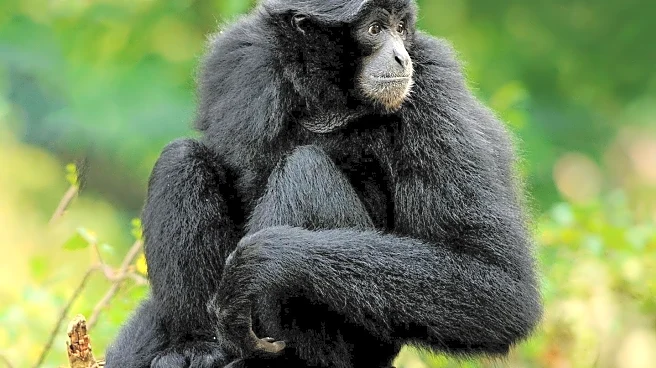What's Happening?
Jane Goodall, a renowned conservationist and primate expert, has passed away at the age of 91 due to natural causes while on a speaking tour in California. Goodall was best known for her groundbreaking research on chimpanzees in Tanzania’s Gombe Stream National Park, where she documented the use of tools and complex social behaviors among the primates. Her work challenged previous scientific assumptions about the uniqueness of human behavior. In addition to her research, Goodall founded the Jane Goodall Institute, which focuses on conservation and environmental advocacy. Throughout her life, she received numerous accolades, including the U.S. Presidential Medal of Freedom.
Why It's Important?
Jane Goodall's contributions to science and conservation have had a profound impact on both fields. Her research on chimpanzees not only expanded the understanding of primate behavior but also influenced the way humans perceive their relationship with the animal kingdom. Goodall's advocacy for environmental conservation has inspired global efforts to protect wildlife and their habitats. Her institute continues to promote sustainable practices and conservation education, affecting policy and public awareness worldwide. Her passing marks the end of an era in primate research and environmental activism, but her legacy continues to inspire future generations.
What's Next?
The Jane Goodall Institute is expected to continue its mission of conservation and environmental advocacy, building on Goodall's legacy. The scientific community may reflect on her contributions and explore new research inspired by her findings. Additionally, there may be tributes and memorials held in her honor, celebrating her life and work. Environmental and conservation groups might use this moment to galvanize support for ongoing and future initiatives aimed at preserving biodiversity and promoting sustainable practices.
Beyond the Headlines
Jane Goodall's work has also raised ethical questions about the treatment of animals and the responsibilities humans have towards other species. Her research highlighted the cognitive and emotional capacities of chimpanzees, prompting discussions about animal rights and welfare. This has influenced both scientific research methodologies and public attitudes towards animals. Her advocacy for environmental conservation has also contributed to a broader cultural shift towards sustainability and ecological responsibility.










